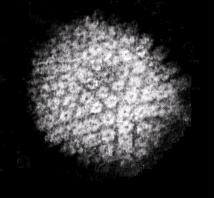US researchers have performed the microbiological equivalent of fighting fire with fire by showing that animals infected with members of the herpes virus family are much better at fighting off infections caused by virulent bacteria than uninfected animals. Writing in this week's Nature, Skip Virgin and his team at Washington University in St Louis infected mice with one of two herpes viruses, either MHV-68 or mouse CMV, both of which cause the rodent equivalent of human glandular-fever-like illnesses.
After the initial infection had passed, the animals were then challenged with potentially lethal doses of either Listeria, or a second bug known as Yersinia pestis, which causes bubonic plague. Compared with a group of control animals, the virally-infected mice were all highly resistant to the bacteria and the team found higher levels of at least two immune-boosting hormones, called interferon-gamma (IFNg) and TNF-alpha, in their bloodstreams.
"This suggests that the viral infection is in some way beneficially modifying the immune system of the host," says Virgin. "A key feature of the herpes viruses is that, after infection, they remain in the body for the life time of the host, a state known as latency. It therefore stands to reason that the virus should want to protect its host, because if the host dies the virus dies".
As yet the team are unsure if the effect also exists in humans, and they're now exploring whether the protective effect extends to defending animals against other viruses and whether it will be possible to re-create the effect without having to be infected with the virus - perhaps by means of some kind of vaccine.
- Previous Al-uminating answer to fuel cell problem
- Next What’s the matter?










Comments
Add a comment